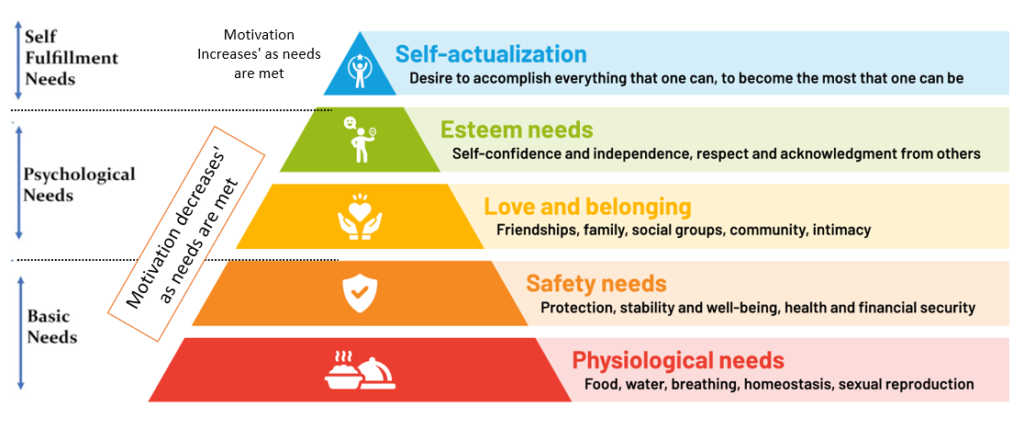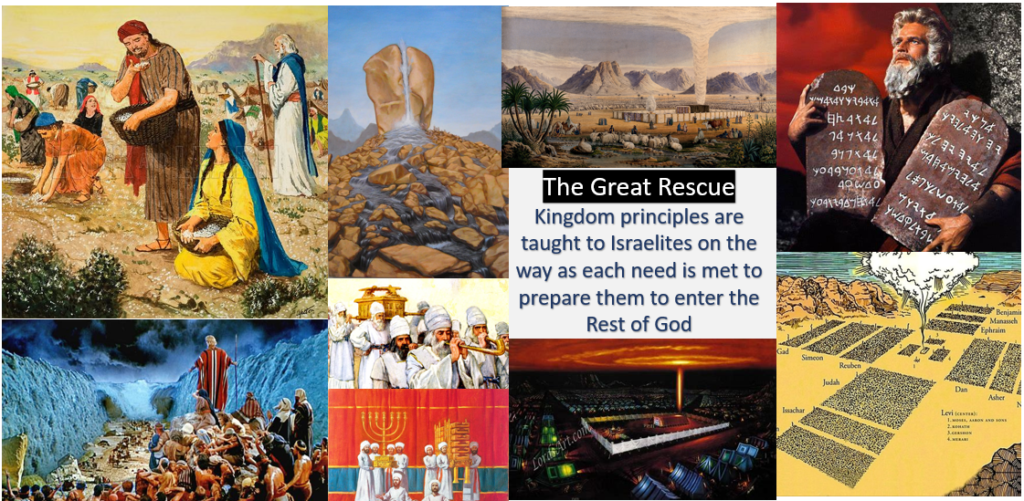Exodus, God’s Economy and Maslow’s Hierarchy of Needs
Introduction
We can see a preview of God’s kingdom on earth when he chose to live among Israelites after exodus by setting up a tabernacle (the Tent of Meeting) in the midst of them. God then declared his laws to them and set a standard for governance dealing with all human needs like sanitation even to salvation. We can see the same theme repeat in the bible by prophets and the revelation of its original application through Jesus Christ in the New Testament. In this presentation let us explore few facts and promises that will expand our understanding of his Truth.
Maslow’s Hierarchy of Needs

Abraham Harold Maslow (1908 – 1970), an American psychologist who migrated from Soviet Russia published an article on ‘A Theory of Human Motivation’ in 1943 that deals with mental health and process to achieve one’s innate potential when basic needs are met as represented in Figure 1 (Hierarchy of Needs). This structure gives a realistic approach to understand human thinking based on their present state of survival with respect to their psychological needs. It symbolizes the process or steps to grow from basic physiological needs like water, bread and shelter to the state of self-actualization where the mind is not worried about any needs. Election slogan ‘Roti, Kapda aur Makaan’ meaning bread, clothing and shelter is offshoot from this theory.
Governments around the world are studying these theories to create policies that improve the living standards of the poor = and provide a vision for scientific and technological aspirations. for improving human conditions =To maintain a right balance, one has to understand how God Implemented them and how he intends to perfect them during millennium demonstrating the Kingdom of God on earth.
God’s System during Exodus
To understand how God took care of these human needs we have to look into the exodus of Israelites from Egypt where God visibly intervened on behalf of his people and instructed them his ways. Let’s explore step by step how God met their psychological needs during wilderness.
- Physiological Needs: These are the basic needs of survival without which men cannot think about next level.
- Water: God purified the bitter water at Marah, God created streams in the desert when Moses struck the rock at Mt. Sainai and later at Kadesh.
- Food: God Provided Manna for food for 40 years during their journey in wilderness.
- Shelter, etc.: God was the pillar of cloud by day and pillar of fire by night so that their cloths and sandals did not wearout.
- Security Needs: Along with God’s protection and deliverance, a system was introduced under his authority to take care of next level of needs.
- Military: God asked each tribe to form a military unit so that the total army was around 6,00,000 fighting men to deal with external threat and God appointed Joshua to fight the battles while Moses/Priests were interceding on their behalf.
- Health: God appointed Levites and elders to maintain hygiene and gave sanitation laws and methods to deal with various diseases eg: sin, leprosy etc.
- Healing: God asked to build a “Brazen Serpent” so that whoever looks at it will be healed. Also, Exodus 12:37 declares that there were none feeble among them.
- Relationship Needs: God defined boundaries and rules for engagement and gave 10 commandments to maintain healthy relationship within society
- Relatives: God marked the boundaries for Edom and Moab and gave that land to them and commanded Moses not to attack them. Also, God instituted a republic structure for each tribe with the hierarchical leadership of ten, hundred, thousand etc to take care of relationships within and between tribes.
- Family: Reaffirmed marriage as a most basic sovereign functional unit that represents the Kingdom of God. And God defined boundaries to keep the institute stable until Jesus comes.
- Judges: God set up 70 elders to arbitrate various disputes, to promote righteousness and to maintain law and order.
- Identity Needs: Within a community each entity (individual/family unit) looks for its own identity within that group. Initially it was God’s idea to give priesthood for all the first born. But because of the rebellion of golden calf the priesthood was passed on to the Levites, and rest of the Israelites did not receive any identity in the Kingdom of God. So, it became an obstacle to unite all the tribes into the Kingdom. Even though not assigned any identity there were some indicators which were later explored by the prophets.
- Basic skills: Gold & gems smith, wood cutter, cloths and leather works, bronze and silver works, music instruments, stone masonry etc.
- Other: Tribal leaders, scribes, seers, judges, teachers, trainers, king/Shepherd etc.
- Self-Actualization: Israelites lost the opportunity to enter into God’s rest as they refused to march into Canaan. But God did not leave them/us without hope. He declared the ‘End from the Beginning’ providing the overall project plan in the imagery of tabernacle and the celebration of feasts as a shadow of things to come. Even now one can reach their original potential like David, Elijah, Daniel but still need a corporate identity for the Remnant.

When any one of these needs are not met, the system falls apart and go into survival mode to maintain the status co and to protect their existing identity power struggle begins and slowly disintegrates into smallest unit of stable system which are built on love like an individual, family or church. As we can see Israelites did not remain united after the rebellion except briefly under Joshua and David.
Progressive Revelations
From Samuel onwards the Old Testament Prophets picked up the theme of Zion and began to expand on the details of God’s plan. But exploitation of innocent and abuse of trust became rampant (by shepherds and fat sheep) to such an extent that law became obsolete and any prophetic revelation irrelevant. With the rise in injustice prophets like Amos, Zephaniah, Haggai etc, cried for God to intervene and received revelations of God’s Justice. For those who repented was given hope but had to deal with sin conscience which became the ultimate obstacle to navigate the path of righteousness. So, the shame and guilt have to be dwelt first before one learns to respect another’s identity and accept/provide services with gratitude towards God. To build this change from within us, an epigenetic imprint of God’s words with corresponding actions was prophesised and implemented in the person of Jesus Christ. Then the concept of fruit of spirit was presented to reintroduce the Law with the understanding of its original intent.
Now with the revelations by the Holy Spirit the individual dreams/visions could be combined to give a complete picture as shown in the book of revelations. This theme is made more clearer by the words of Jesus “seek ye first the Kingdom of God and his Righteousness than all these things will be added unto you”. Let us look at this in little more detail from the Old and New Testament analogies and prophesies:
- Physiological Needs: Jesus’s constant admonition was not to worry about tomorrow and by resurrection Jesus even took care of the fear of death. Let’s see how prophets envisioned it:
- Without money without price: Isaiah 55:1 speaks about divine economy where wine and milk are freely distributed.
- No hunger, no thirst: Isaiah 49:10, Revelation 7:16 conveys the same message in different wordings.
- Needs will be met (Phil 4:19) so don’t worry about food or clothing (Mat 6:25).
- Mansions: God’s shelter is the constant theme in Psalms and in John chapter 14 Jesus mention mansions in father’s kingdom.
we notice the same principle in Ezekiel’s temple and distribution of land to the 12 tribes or disciples of Jesus distributing supply to poor and widows (Acts 6:1-2). In Isaiah 2:4 we see nations beat their swords into plowshares and their spears into pruning hooks. Which means at the governmental level the farming is done and distributed. A win-win model for nations which is a Joseph principle to stock basic needs.
Coming Next:
Part 2 deals with the problem of satisfaction at each level and on hope, sin and abuse of resources and Plan of Zion







